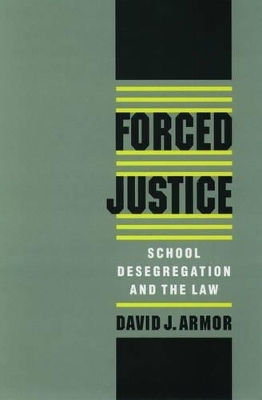
Forced Justice
School Desegregation and the Law
Seiten
1996
Oxford University Press Inc (Verlag)
978-0-19-511135-4 (ISBN)
Oxford University Press Inc (Verlag)
978-0-19-511135-4 (ISBN)
In 'Forced Justice', David J. Armor explores the entire range of controversial issues in school desegregation policy, including evolving Supreme Court doctrines, the educational and social impacts of desegregation, and the effectiveness of mandatory versus voluntary desegregation methods, including magnet schools.
School desegregation and "forced" busing first brought people to the barricades during the 1960s and 1970s, and the idea continues to spark controversy today whenever it is proposed. A quiet rage smolders in hundreds of public school systems, where court- ordered busing plans have been in place for over twenty years. Intended to remedy the social and educational disadvantages of minorities, desegregation policy has not produced any appreciable educational gains, while its political and social costs have been considerable. Now, on the fortieth anniversary of the Supreme Court's epic decision, Brown v. Board of Education, the legal and social justifications for school desegregation are ripe for reexamination.
In Forced Justice, David J. Armor explores the benefits and drawbacks of voluntary and involuntary desegregation plans, especially those in communities with "magnet" schools. He finds that voluntary plans, which let parents decide which school program is best for their children, are just as effective in attaining long-term desegregation as mandatory busing, and that these plans generate far greater community support. Armor concludes by proposing a new policy of "equity" choice, which draws upon the best features of both the desegregation and choice movements. This policy promises both improved desegregation and greater educational choices for all, especially for the disadvantaged minority children in urban systems who now have the fewest educational choices.
The debate over desegregation policy and its many consequences needs to move beyond academic journals and courtrooms to a larger audience. In addition to educators and policymakers, Forced Justice will be an important book for social scientists, attorneys and specialists in civil rights issues, and all persons concerned about the state of public education.
School desegregation and "forced" busing first brought people to the barricades during the 1960s and 1970s, and the idea continues to spark controversy today whenever it is proposed. A quiet rage smolders in hundreds of public school systems, where court- ordered busing plans have been in place for over twenty years. Intended to remedy the social and educational disadvantages of minorities, desegregation policy has not produced any appreciable educational gains, while its political and social costs have been considerable. Now, on the fortieth anniversary of the Supreme Court's epic decision, Brown v. Board of Education, the legal and social justifications for school desegregation are ripe for reexamination.
In Forced Justice, David J. Armor explores the benefits and drawbacks of voluntary and involuntary desegregation plans, especially those in communities with "magnet" schools. He finds that voluntary plans, which let parents decide which school program is best for their children, are just as effective in attaining long-term desegregation as mandatory busing, and that these plans generate far greater community support. Armor concludes by proposing a new policy of "equity" choice, which draws upon the best features of both the desegregation and choice movements. This policy promises both improved desegregation and greater educational choices for all, especially for the disadvantaged minority children in urban systems who now have the fewest educational choices.
The debate over desegregation policy and its many consequences needs to move beyond academic journals and courtrooms to a larger audience. In addition to educators and policymakers, Forced Justice will be an important book for social scientists, attorneys and specialists in civil rights issues, and all persons concerned about the state of public education.
About the Author: David J. Armor is Research Professor at The Institute of Public Policy, George Mason University. While writing this book he was Senior Research Scholar of the Social Philosophy and Policy Center of Bowling Green State University, Ohio and Visiting Professor in the Department of Sociology, Rutgers University. Formerly he was Senior Social Scientist at the Rand Corporation and Associate Professor of Sociology at Harvard University. He has also served as an elected member of the Los Angeles Board of Education and Acting Assistant Secretary of Defense for military manpower and personnel.
| Erscheint lt. Verlag | 26.9.1996 |
|---|---|
| Zusatzinfo | 38 line drawings |
| Verlagsort | New York |
| Sprache | englisch |
| Maße | 156 x 235 mm |
| Gewicht | 403 g |
| Themenwelt | Recht / Steuern ► Arbeits- / Sozialrecht ► Sozialrecht |
| Recht / Steuern ► EU / Internationales Recht | |
| Sozialwissenschaften ► Pädagogik | |
| ISBN-10 | 0-19-511135-4 / 0195111354 |
| ISBN-13 | 978-0-19-511135-4 / 9780195111354 |
| Zustand | Neuware |
| Haben Sie eine Frage zum Produkt? |
Mehr entdecken
aus dem Bereich
aus dem Bereich
meine Rechte: Wohnen, Arbeiten, Steuern, Mobilität
Buch | Softcover (2024)
C.H.Beck (Verlag)
CHF 16,65
Textausgabe mit ausführlichem Sachverzeichnis
Buch | Softcover (2024)
dtv Verlagsgesellschaft
CHF 29,25
Buch | Softcover (2024)
dtv Verlagsgesellschaft
CHF 27,85


